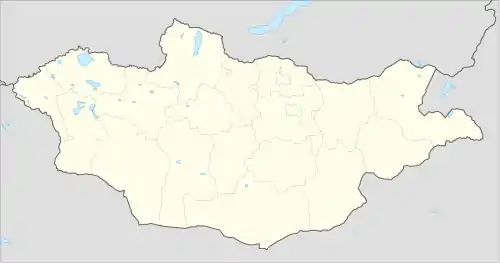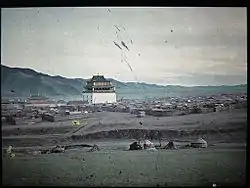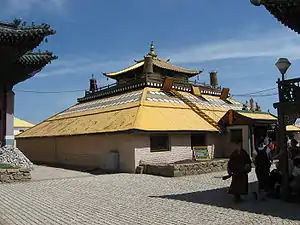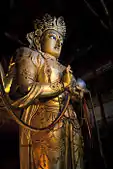Gandantegchinlen Monastery
The Gandantegchinlen Monastery (Mongolian: Гандантэгчинлэн хийд, Gandantegchinlen khiid, short name: Gandan Mongolian: Гандан) is a Mongolian Buddhist monastery in the Mongolian capital of Ulaanbaatar that has been restored and revitalized since 1990. The Tibetan name translates to the "Great Place of Complete Joy". It currently has over 150 monks in residence. It features a 26.5-meter-high statue of Avalokiteśvara. It came under state protection in 1994.
| Gandan Monastery | |
|---|---|
.jpg.webp) Temple of Boddhisattva Avalokiteshvara at Gandantegchinlen Monastery | |
| Religion | |
| Affiliation | Tibetan Buddhism |
| Sect | Gelug |
| Location | |
| Location | Ulaanbaatar |
| Country | Mongolia |
 Location within Mongolia | |
| Geographic coordinates | 47°55′23″N 106°53′42″E |
| Architecture | |
| Style | Chinese, Mongol and Tibetan influences Features a 26.5-meter-high statue of Avalokiteśvara |
| Founder | Yongzheng Emperor |
| Date established | 1727 |
History

The monastery was constructed by order of the 5th Jebtsundamba Khutuktu in 1809. The first temple was the Gungaachoilin Datsan. Only one wooden pillar remains from this temple. In 1838, the Gandantegchenlin Temple was built along with the private residence of the Jebtsundamba Khutuktu. The 13th Dalai Lama stayed in the residence in 1904. In 1840, the Vajradhara Temple was built. In 1869, the Zuu Temple was built. In 1913, the tall Avalokiteśvara temple was built. In 1925, the temple for keeping the remains of the 8th Jebtsundamba Khutuktu was built. It is now the monastery library.
In the 1930s, the Communist government of Mongolia, under the leadership of Khorloogiin Choibalsan and under the influence of Joseph Stalin, destroyed all but a few monasteries and killed more than 15,000 lamas.
Gandantegchinlen Khiid monastery, having escaped this mass destruction, was closed in 1938, but then reopened in 1944 and was allowed to continue as the only functioning Buddhist monastery, under a skeleton staff, as a token homage to traditional Mongolian culture and religion. With the end of Marxism in Mongolia in 1990, restrictions on worship were lifted.
Statue
The original statue, made of copper, was built after appeals to the Mongolian public; its intent was to restore the sight of the 8th Jebtsundamba, also known as Bogd Khan), who had claimed the title of Emperor of Mongolia. The statue was built by Bogd Javzandamba's principal minister, Chin Wan Khanddorj. Russian troops dismantled the original statue in 1938. After the end of the Soviet era, the statue of Avalokiteśvara was rebuilt in 1996, funded by donations by the Mongolian people. It features 2,286 precious stones and is gilded with gold leaf.
Since 1992, the Supreme Leader of the Centre of All Mongolian Buddhists and Abbot of Gandantegchinlen Monastery has been Lama Gabju Choijamts Demberel.
The monastery is surrounded by the Gandan ger suburb.
- Images of Gandantegchinlen Monastery
 Golden Temple at Gandan Monastery
Golden Temple at Gandan Monastery Stupa and other buildings at Gandan Monastery
Stupa and other buildings at Gandan Monastery 19th-century painting of Gandan Monastery
19th-century painting of Gandan Monastery.JPG.webp) Avalokiteśvara. Tallest indoor statue in the world, 26.5-meter-high, 1996
Avalokiteśvara. Tallest indoor statue in the world, 26.5-meter-high, 1996 Avalokiteśvara
Avalokiteśvara.jpg.webp) Avalokiteśvara
Avalokiteśvara
See also
References
External links
![]() Media related to Gandan Monastery at Wikimedia Commons
Media related to Gandan Monastery at Wikimedia Commons
- Official website of the Gandan Monastery
- Photos of monastery
- Article
- Photos
- Article on Ulaanbaatar with a section on the monastery
- Buddhism in Mongolia After 1990
- An interview with Tibetologist Glenn H. Mullin